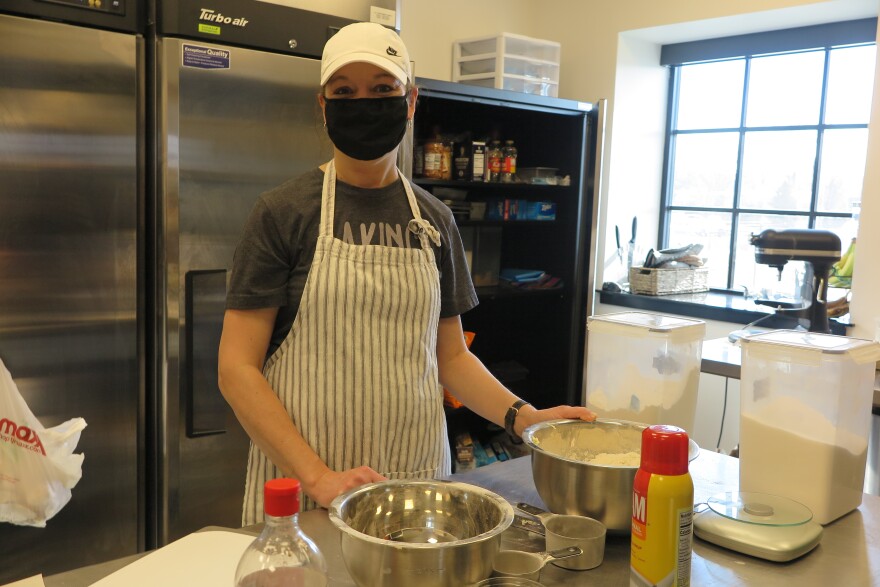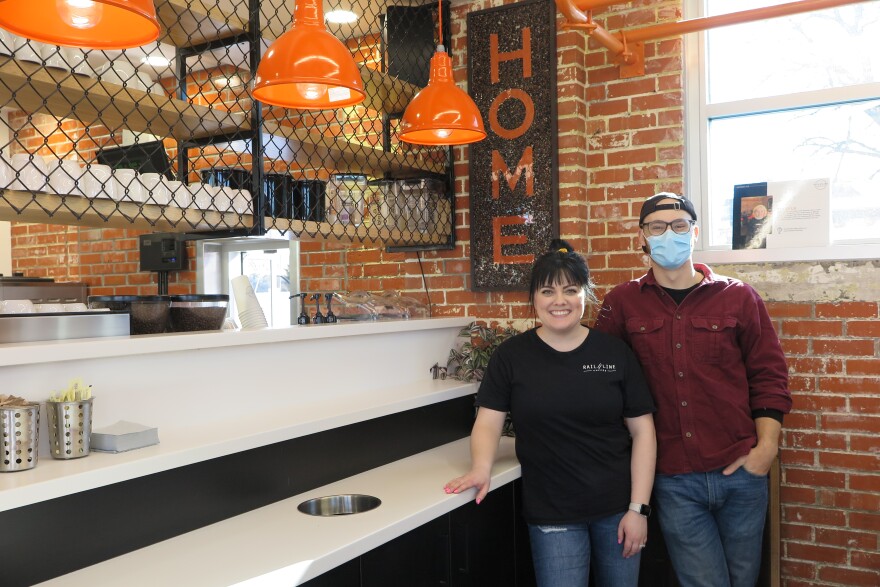On the south side of the tracks in Billings, new hope and opportunity are brewing. At Rail Line Coffee, a cup of coffee is made with purpose inside a renovated gas station and auto repair shop, opened last summer in August, during the COVID-19 pandemic. Renovation of their building was underway in March just as the world was shutting down in response to the virus.
The Employee Apprentice Program at Rail Line Coffee provides a training ground where budding baristas not only learn to make a good brew, but also gain valuable team building skills and other job-specific knowledge that allows mobility in a rapidly evolving work environment.

As a project conceived by Community Leadership and Development, Inc. (CLDI), Rail Line Coffee supervisor Colin Sauskojus said, “We offer a second chance to a lot of individuals who have been marginalized or have decided they don’t have much to offer to society, so we are really looking for individuals that we can employ, and infuse hard skills, while training them so they can move into something that is sustainable for them.”
The idea of the coffee shop came from Executive Director, Eric Bayse when he came upon similar programs in Seattle, Washington and Portland, Oregon. Sauskojus said, “We are focusing on young adults within the south side community that have exhibited some sort of barrier to employment.”

The application for the nine- to eighteen-month program can be found online at https://raillinecoffee.com/. The form is easy to fill out. “We realize that the traditional application and interview can actually be a barrier to finding a job,” Sauskojus said. “All we are trying to do is to turn them into an awesome employee. They learn their basic coffee making skills. However, there’s a lot more to it, such as learning customer service in an effort to really provide an excellent customer experience.”
Currently there are fourteen members on the Rail Line team with a mixture of apprentices and employed baristas. Kailyn McKinley, assistant manager, who oversees the work of team members, also “enjoys interacting with the people who come in from the south side with a variety of backgrounds.”
“Hey, we want to know your name. We want to know your story,” said McKinley, recalling a time she had stepped into cafe to dance with a customer.
Across the street in a remodeled building that was once home to the longest bar in Montana, Sandi Eaton bakes up scones, muffins and breads for the café. She supplements the wraps and other goods coming from The Annex Coffeehouse.

The local vibe continues with the use of local coffee beans roasted by wholesale coffee roasting company, Revel Coffee. Owner Gary Thiesen worked with the CLDI team to come up with two custom blends: Shalom and Exalt.
Thiesen’s beans are distinct, nuanced with fruit, floral and spice notes along with the more common cacao flavors. Coffee drinking can be likened to that of wine where a drinker begins with drinking more fruit forward wines backed with oak or leaning towards sweeter blends. With time, the drinker seeks wines with more distinct and unique flavors and aromas.
In the coffee world, most commercial roasters manufacture light, medium and dark roasts. Dark roasts are prevalent in “fast coffee”, carrying charred notes.
Thiesen selects the beans he roasts carefully, he shared, “I deal with many different importers. The types of coffee I am bringing in are always specialty grade coffee, and even within specialty grade coffees, I am looking at top lots. I am always looking for unique coffees with unique flavor profiles.”
He continued, “I ask a lot of importers to send me what they have that is tasting amazing. I bring them in and blindly evaluate them. A lot of times I don’t know where they are from and I mix and match them and blindly cup and evaluate them and then I select the ones that come out on top.”

The testing procedure known as cupping promotes evaluating coffees efficiently. In a small cup or bowl, grounds are immersed in hot water for four to five minutes. The aroma and the taste are then evaluated.
“The hallmark of a really good coffee is one that it actually improves as it cools. You get first impressions when it is hot. It comes to life later when the cup is cooled down a little, and you can taste more of the nuance in the coffee,” Thiesen said.
Roasting the beans is a nuanced art, as Thiesen explained, “A romantic way to put it, is that the coffee tells you how it needs to be roasted, and they all do change depending on country of origin. That process is called coffee profiling. You can roast coffee in a host of different ways, altering the roast by changing temperature over time, and how aggressively heat is added, air flow, and drum rotation. It’s a continual process and you can make little tweaks. It’s really a lot of trial and error.”
More specifically, Thiesen described the craft of coffee roasting as “coffee is half heart and half science.”

To enjoy coffee at home, Thiesen recommended spending money on “a good grinder rather than on an elaborate brewing system.” Pre-ground beans are prone to oxidation and become stale quickly. A cheap grinder does not process the beans evenly and can “chop and hack at the beans as it is grinding.”
Water boiled to 200 degrees and above will provide the best extraction. Though Thiesen’s brewing methods change from time to time, his current go-to is the Kalita Wave process where coffee is made through a flat-bottom filter with a wavy patterned side.
Revel coffee beans are available online at https://revelcoffee.com/ and at other outlets in Billings such as Black Dog Coffee, Ebon Coffee Collective, The Annex Coffeehouse, and Rail Line Coffee. Here at Yellowstone Public Radio, fellow community programmer Russell Rowland has his own blend: 56 Counties.
Even during the COVID pandemic challenges, Rail Line Coffee and Revel Coffee have kept our community caffeinated with purpose and opportunity.




